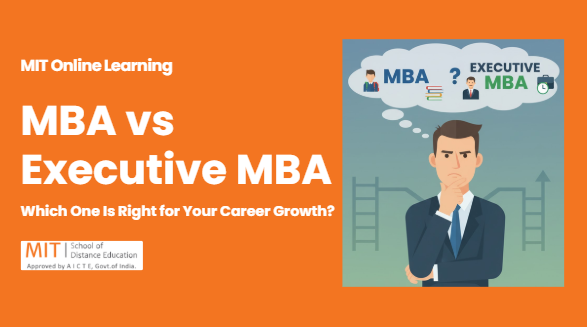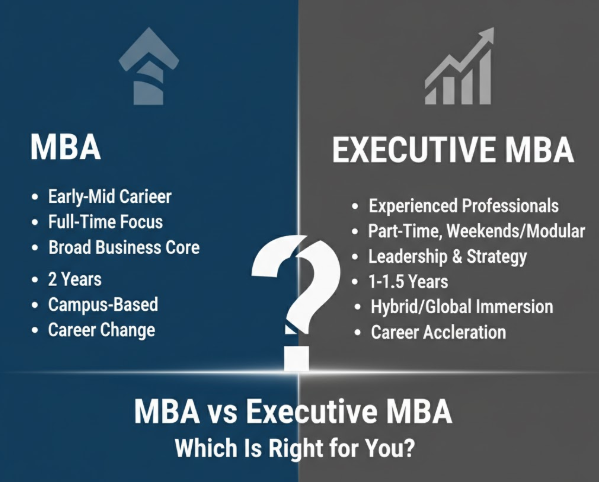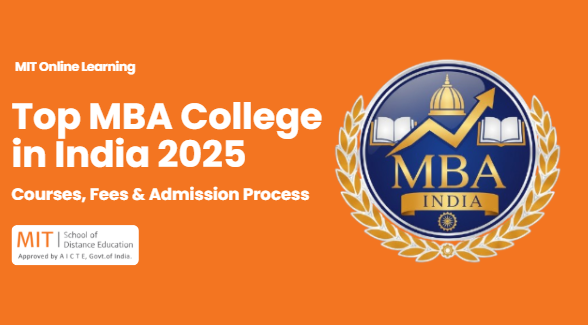
Introduction
In today’s competitive world, higher education plays a crucial role in career advancement. Among all professional degrees, the Master of Business Administration (MBA) and the Executive MBA (EMBA) stand out as powerful credentials for individuals seeking leadership roles.
But one question often arises — “Which one is right for me — MBA or Executive MBA?”
Whether you are a recent graduate or an experienced professional, understanding the difference between both programs is essential to choosing the right path for your career growth. Let’s explore their key differences, eligibility, fees, salary scope, and how institutions like MIT School of Distance Education (MITSDE) can help you achieve your goals.
What Is an MBA?
An MBA (Master of Business Administration) is a two-year postgraduate program that focuses on building managerial, analytical, and leadership skills.
Who Can Apply for an MBA?
Students who have completed their graduation from a recognized university are eligible for an MBA. Most candidates join right after graduation or with minimal work experience.
What Does the MBA Course Offer?
An MBA provides a deep understanding of business functions such as:
- Marketing Management
- Financial Management
- Human Resource Management
- Project Management
- Operations and Supply Chain
The program emphasizes case studies, internships, and projects to prepare students for managerial positions.
💡 If you are at the beginning of your career and want to explore business management roles, an MBA is an ideal starting point.
What Is an Executive MBA (EMBA)?
An Executive MBA is designed specifically for working professionals with significant experience (usually 3- 5 years or more). Unlike the regular MBA, it focuses on practical business strategies, leadership development, and decision-making skills.
Who Should Pursue an Executive MBA?
If you are already employed in a mid-level or senior role and wish to accelerate your career or switch industries, the Executive MBA is perfect for you.
Can You Do an Executive MBA While Working?
Yes! Most EMBA programs are structured with flexible schedules — such as weekend classes, evening lectures, or online learning — so you can continue working while studying.
💡 An EMBA helps professionals move into senior management and leadership positions without taking a career break.
Key Differences Between MBA and Executive MBA
Feature | MBA | Executive MBA |
Target Audience | Fresh Graduates | Working Professionals |
Work Experience | 0–2 years | 5+ years |
Program Duration | 2 years | 1–1.5 years |
Learning Mode | Full-time | Part-time / Online / Hybrid |
Curriculum Focus | Academic & Theoretical | Practical & Strategic |
Networking | Student-level peer learning | Industry-level professional networking |
Fee Structure | Moderate | Higher but offers faster ROI |
Career Stage | Early Career | Mid to Senior Career |
Student Search: “Is an Executive MBA equal to a regular MBA?”
Both are postgraduate management degrees. However, an Executive MBA focuses more on leadership, business transformation, and strategic decision-making, whereas a traditional MBA is about building foundational management skills.

MBA vs Executive MBA: Which Is Right for You?
Choose MBA If:
- You are a recent graduate or early-career professional.
- You want to build a strong foundation in management and leadership.
- You can commit full-time to studies.
- You are looking to switch careers or industries.
Choose Executive MBA If:
- You already have 5+ years of experience.
- You want to move into senior management or leadership positions.
- You prefer part-time or online study options.
- You are looking for faster career advancement and higher ROI.
💡 Tip: If you are still early in your career, a traditional MBA is better. If you already have experience and want to lead, an Executive MBA gives you an edge.
Career Opportunities After MBA and Executive MBA
After MBA:
- Marketing Manager
- Financial Analyst
- Operations Manager
- Business Development Manager
- HR Manager
After Executive MBA:
- Senior Project Manager
- Director of Operations
- Vice President (Sales/Marketing)
- Chief Marketing Officer (CMO)
- Business Consultant
Both programs open doors to exciting career paths, but the Executive MBA often leads directly to leadership roles due to the experience factor.
Salary Comparison: MBA vs Executive MBA
Average Salary After MBA (India):
- Freshers: ₹4–7 LPA
- 3–5 years experience: ₹8–12 LPA\
Average Salary After Executive MBA (India):
- Mid-level professionals: ₹12–20 LPA
- Senior roles: ₹25–40 LPA
The Executive MBA offers a higher salary boost since it caters to experienced professionals ready for managerial and leadership roles.
💡 Student Search: “Does an Executive MBA guarantee a higher salary?”
While it doesn’t guarantee, it significantly increases your chances of promotions, leadership positions, and better pay due to your enhanced skill set and network.
Which Program Offers Better ROI?
Both programs offer strong returns, but in different ways:
- MBA ROI builds gradually as you gain experience.
- Executive MBA ROI is faster because professionals apply their learning directly in their jobs, resulting in immediate performance improvements and promotions.
When choosing, consider your career stage, time availability, and long-term goals.
Why Choose MITSDE for MBA or Executive MBA Programs?
When it comes to management education that blends academic excellence with flexibility, MIT School of Distance Education (MITSDE) stands among India’s best institutions.

Why Students Prefer MITSDE:
- AICTE-approved Online PGDM and Executive PGDM programs.
- Flexible learning for working professionals.
- Industry-oriented curriculum designed by experts.
- Comprehensive digital learning platform for anywhere access.
- Placement support & career guidance from seasoned mentors.
Whether you are pursuing your first management degree (PGDM) or advancing your leadership skills through an Executive PGDM, MITSDE helps you grow professionally without pausing your career.
Conclusion
Both MBA and Executive MBA hold immense value in today’s business landscape. The difference lies in when and why you pursue them.
If you are a fresher seeking to kickstart your career, an MBA gives you the right foundation. But if you’re already established and looking to lead, the Executive MBA (or Executive PGDM) is your best path forward.
At MITSDE, you can choose a flexible, industry-relevant, and AICTE-approved program tailored to your career goals.
📞 Call Now: 9112-207-207
🌐 Explore: www.mitsde.com
Invest in your future today — because the right management degree can redefine your tomorrow.



